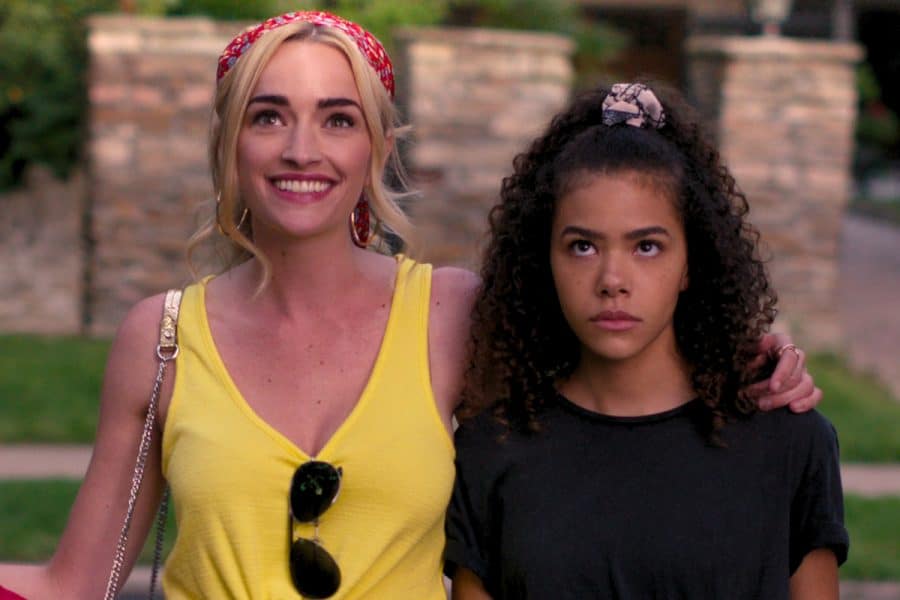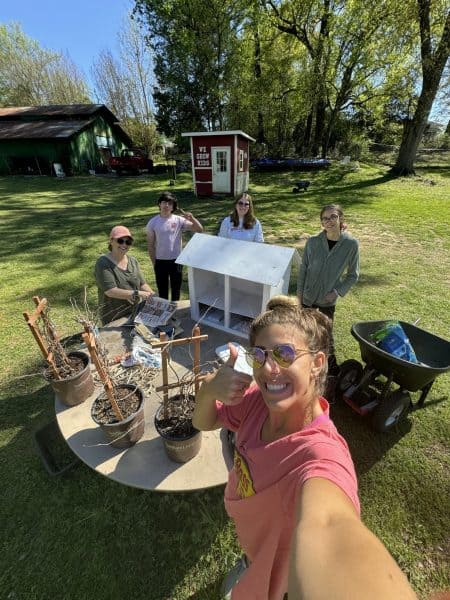Culture Pick | “Ginny & Georgia” tries too hard
Netflix’s “Ginny & Georgia” tries to be a lot of things but, sadly, it falls short.
March 21, 2021
“Ginny & Georgia” is advertised as a modern “Gilmore Girls,” so my expectations were obviously high. The similarities are definitely unavoidable, and they’re a bit lazy.
Georgia Miller, played by Brianne Howey, is the beautiful, 30-year-old mother of cynical teenager Ginny, played by Antonia Gentry. Georgia has a flirty friendship with the local restaurant owner. Ginny’s free-spirited father Zion, played by Nathan Mitchell, eventually breezes into their New England town on a motorcycle to pick up his and Georgia’s on-again, off-again relationship. The similarities are definitely unavoidable, and they’re a bit lazy.
Then, a mysterious past and unraveling criminal history are added to spice things up.
Oh, and there’s Austin, played by Diesel La Torraca, Georgia’s son and Ginny’s half-brother.
Recently widowed Georgia and her kids have frequently moved around but now plan to settle down for good in Wellsbury, Mass., using the inheritance from her relatively new, now-dead husband. If that sounds suspicious, it should.
Ginny and Austin beg Georgia not to jump into another relationship, but, of course, she immediately sets her sights on the mayor, played by Scott Porter, and manipulates her way into a job in his office.
She also defrauds a local boutique to get a new handbag, but that’s neither here nor there.
Ginny has struggled to make friends in the past, but to her surprise, she’s quickly welcomed by her outgoing neighbor Maxine, played by Sara Waisglass. Maxine accepts Ginny into her group of friends, which everyone refers to as “MANG” in a gross, yet inexplicably endearing way. Ginny even loses her virginity to Maxine’s brooding twin brother Marcus, played by Felix Mallard, in the first episode.
Austin has a harder time adjusting as he’s bullied in school, but don’t worry, because Georgia helps him break his bully’s nose.
Apparently violence is the answer, because the audience soon learns through a series of flashbacks that Georgia also murdered her ex-husband. To be fair, though, the man was sexually harassing Ginny, and Georgia had been sexually assaulted by her own step-father, so it does seem somewhat justified.
Again, this is all in the first episode. What’s more, the other nine episodes are just as action-packed. In fact, it starts to feel too packed.
What “Ginny & Georgia” lacks are the key ingredients that made “Gilmore Girls” so good: authenticity and simplicity.
Lorelai and Rory Gilmore’s chemistry literally carried an entire show, but Georgia and Ginny’s interactions just feel disconnected and rehearsed.
“Gilmore Girls” also understood that ordinary characters with ordinary lives are complicated and challenging enough to hold an audience, if done right.
“Ginny & Georgia,” on the other hand, resorts to using gimmicks and surprise twists to keep the audience’s attention.
In the end, it all just feels… forced.
Ginny’s teenage angst and Maxine’s quirky, overly talkative energy feel, sadly, phony. It feels like acting, which is the last thing an audience wants from actors. But the biggest offender is Howey.
Yes, Georgia as a character is extremely calculated and deceitful, but in the pivotal moments when she lets her guard down and is emotionally vulnerable, Howey’s portrayal lacks the authenticity and sincerity that the audience desperately wants.
However, I do have to applaud one positive that “Ginny & Georgia” brings to the table: realistic diversity.
The series not only confronts racism and experiences of biracial individuals, but it also features diverse characters whose storylines don’t just revolve around their ethnicities or disabilities.
It’s absolutely worth celebrating, but it doesn’t save the series.
Ultimately, I braved an entire season of Howey’s headache-inducing fake Southern accent to conclude that “Ginny & Georgia” is fine, if you have nothing else to watch.











